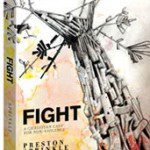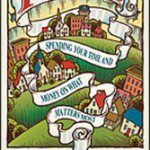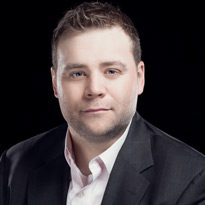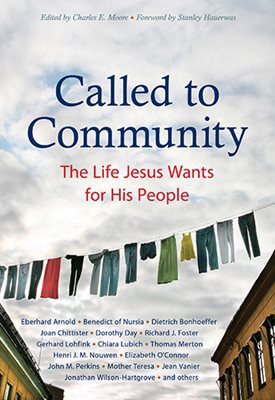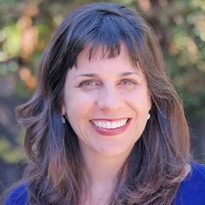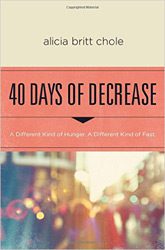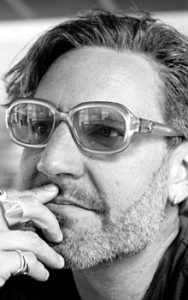 In his foreword to the new book Free: Spending Your Time and Money on What Matters Most by Mark Scandrette, Richard Rohr reminds us that Jesus makes the point in the Sermon on the Mount that “where your treasure is, there your heart will be” (Matthew 6:21). Or said another way, to find out what someone’s priorities and values are, just look at their checkbook.
In his foreword to the new book Free: Spending Your Time and Money on What Matters Most by Mark Scandrette, Richard Rohr reminds us that Jesus makes the point in the Sermon on the Mount that “where your treasure is, there your heart will be” (Matthew 6:21). Or said another way, to find out what someone’s priorities and values are, just look at their checkbook.
This month in the Patheos Book Club, we’re taking a look at faith and money, using Scandrette’s new book, Free, as a guide. In the deeply inspiring and practical book packed with wonderful anecdotes and assessment tools, Mark (with a little help from his wife Lisa) shares the secrets of how they bought a home and raised a family debt-free in the most expensive city in the United States — and how they’ve enjoyed good relationships, good adventures and good food along the way. And he provides the deep questions and tools to get us started on our own path to “freedom” from financial burden and stress as well.
Mark took some time out from driving up the Northern California/Oregon coast with his wife and three children packed in their “Toaster” car, a 2005 Scion XB to answer a few questions about his book. For more conversation on Free — and to read an excerpt — visit the Book Club here.
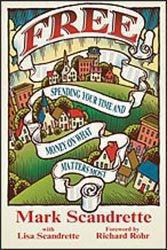 There are hundreds of books out there from a Christian perspective on how to live more simply. What makes your book different from the others?
There are hundreds of books out there from a Christian perspective on how to live more simply. What makes your book different from the others?
When we surveyed the market before beginning this project we noticed certain patterns or themes in books about simplicity. Of course the most popular are books about financial freedom, budgeting and getting out of debt, which address the tremendous ache and pain that many of us feel about our money situations. Then there are the frugality books for those of us who geek out on stretching our dollars, living on the cheap or beating the system. We also noticed books that advocate for a simplicity of the interior life: de-cluttering and eliminating distractions and busyness to make space for God and people. Then, there are books advocating for voluntary simplicity from an ecological perspective, though perhaps less of these books are written from a faith perspective.
We heard from many people that they liked aspects of the books they had read, but there was a point of disconnect. The book about financial freedom was practical but seemed more about building personal wealth that participating in God’s bigger dreams for our world. The ecologically oriented books were guilt inducing and often apocalyptic. Many of the interior simplicity books, though thoughtful, assumed privilege or lacked practicality. Perhaps the most interesting simplicity books are ones written as publicity stunts about taking on an extreme lifestyle for a time — Thoreau’s Walden Pond being an early example of this kind of stunt.
We think each of these approaches to simplicity are part of a larger whole about living abundantly as engaged participant in God’s kingdom. Our goal was to create a practical resource that appreciates and integrates the soul postures, global awareness and practical competencies required to become free with time and money. There is also a stunt aspect to the book in that we share from our experiences and tell stories about individuals and groups who have taken risks to take new steps in their lives with money, meaning and global sustainability.
There are also lots of popular books and seminars on money management going around the Church right now. Again, what differentiates Free?
We take a spiritual formation approach to the topic. Jesus’ teachings suggest that we live in a world of abundance where we can flourish and do good. The animating question in Free is, “What are the steps I can take with time and money that will help me be the most free to pursue what matters most in life?” We begin with questions of meaning and vision. What really matters? Am I spending my time and resources on what I say are most important? We don’t even begin to talk about financial management or economizing until chapters 5 and 6. There’s a reason for this. If we first address soul issues, our beliefs and desires, then the practical aspects of money management are more easily navigated. Each chapter in the book explores a step in this process:
1. Name what matters most to you
2. Value and align your time
3. Practice gratitude and trust
4. Believe you have enough
5. Create a spending plan
6. Maximize your resources
7. Live generously and spend wisely
Many of us are wounded or tender when it comes to time, money and the meaning of our work. We are often tempted to feel shame and regret about the choices we’ve made and some of us feel compelled by a list of “shoulds” about how to live more simply. With this book we’ve tried to avoid the traps of shame and “shoulds” and forced prescriptions to be followed. Instead, we invite the reader to identify how they are being invited to take healthful steps towards an abundant way of life that is freer and lighter than the false paths we have created for ourselves.
Who did you write this book for?
We are assuming that most of our readers already share our passions and concerns, so the emphasis in the book is about how young people, families and the rest of us take healthful steps to live more consciously. If we are honest, most of us struggle to live out our deepest values with consistency. It’s easy to focus on systems of injustice and inequity, while avoiding the small steps we can take to live from the center. We wanted to address that ache in the book and provide some tools for personal transformation.
We are encouraged by the growing awareness and interest many people have in living a whole life of faith that includes soulfulness, creativity, a heart for justice and a commitment to people and place. This is reflected in a wide variety of emerging expressions that are sometimes labeled as the “missional church,” neo-monastacism, placed based faith and widespread concern about global poverty and justice. To be fruitfully realized, these good impulses and visions need to be matched with sustaining time and economic practices. I’m burdened by seeing friends held back from their good dreams for meaningful work and service and community because of school and consumer debts. I’m burdened for other friends who are held back from taking risks in their lives because of worries and fears and messages they have internalized about scarcity and self-protection. And we all must wrestle with how to pursue a “good life” than can be shared by all, rather than by the minority of us who live in the first world.
This book is based on workshops and learning labs that Lisa and I have facilitated over the past 7 years in the Bay Area. We started these offerings because we kept seeing how people’s financial choices affected their availability to pursue meaningful work and service and maintain healthy life rhythms. How you spend your time is how you spend your life. And how you spend your time is largely determined by how you manage your money. We take an active group approach to learning many people have been empowered to take new and positive steps in their lives.
Your first chapter is the inspiring account of how you and your wife (then girlfriend) began your adventure of trying to live differently from the cultural norm. Ultimately, you demonstrated that a family of five could live debt-free in San Francisco and still have a life of abundance. I found this chapter incredible! How hard has it been to live this way?
We felt like sharing our story was important to establishing our credibility on this topic. But the danger is in making one very unique story prescriptive. Living on purpose sustainably is going to look different for each person and in the book we highlight people from many different circumstances and walks of life pursuing these things. For us it’s been a fantastic adventure seeking to live simply and creatively over 23 years. We don’t often think about it being difficult, though we are often reminded that we have made different choices than the norm and that to live as we do requires work and focus. With any choice we make in life there are trade offs, so we try to celebrate the benefits of the choices we make and learn from our mistakes. Some people who knew me 10 or 15 years ago may have thought of me as a shrewd cheap skate. As a point of growth, I’m learning to relax a bit, live more generously and provide work to others.
Free is really a guidebook to financial freedom in the service of living more like Jesus. Along with the book there is a video resource to help guide you through the practices. It’s a very, very practical book with concrete exercises to walk you through this process. Is your sense that this is really hard to do, and we need experienced guides and very specific instructions?
I’ve noticed that most of us are better talkers than doers, even when we want to take action. Our thoughtfulness and interest in conversation can sometimes mask internal resistance to positive change. If you study pedagogy, as adults we learn best through taking action, so over the years, through trial and error, we’ve found that in a group its important to set up an expectation and contract for common action. That’s a facilitation skill that is unfamiliar to many of us in the faith space, and it takes more time and effort that just being a discussion leader in a book group. We mean well, but change and growth require more effort and intentionality. In other spaces we respect the guidance of a yoga instructor or the tasks the therapist or doctor gives us, and we can learn to adopt the effectiveness of this approach in spiritual formation settings as well. Since it’s a new skill, we’ve incorporated clear but non-prescriptive tasks in each chapter and I reinforce these tasks in the videos to make it easier for a small group leader.
I wonder if most of us even know what we’d do if we didn’t have to make a lot of money… if we could truly live more free! This may sound silly, but how do we start thinking about what we would do with such freedom, from a Christian context?
I’m fascinated that though we live in one of the wealthiest economies on earth, so many of us feel stretched for time, stressed about our finances or perplexed about what makes life meaningful. We are privileged to even have the space to ask questions about what would be meaningful, while 3 billion of our neighbors struggle for basic survival on less than 2 dollars a day. I only say this to put our situation in perspective. The ancient wisdom of the scriptures is that life is inherently meaningful and that all of us can enjoy the simple pleasures of food, work and relationships. As the Apostle Paul put it, “if we have food and clothes, we will be content with that.” I suspect that what keeps us from living more free is the pervasive lie that we need more to be happy, and this leads to hurry, striving, worry, greed and discontent. We really can examine and interrogate these scripts and learn from observation that another concert, vacation, luxurious meal, new home or car doesn’t bring the satisfaction that we hoped it would. Jesus really did offer a liberating alternative to this scarcity view of our lives. In the book we suggest some exercises and daily practices that might help us inhabit the reality of abundance and contentment, one of them being the practice of gratitude.
I have a friend who really longs to live this way, but she doesn’t think her husband would go all in. How would you advise someone who is in a family unit where there’s not complete buy-in?
We think that the place to begin is by talking about life vision. What’s really important to us? What were we made to do? Who are the people in our lives it’s important to care for? What will we look back and say was meaningful in our lives when we are 85years old? If a couple can have a conversation about these kinds of questions, then it becomes easier to get on the same page about financial decisions. Most of us also make changes gradually, in small steps over time, so a couple can decide what their beginning steps are and then see where that leads.
What was the hardest chapter to write for you? What was the easiest?
It was challenging to find a way to write about time that wouldn’t just play into the common messages we tell ourselves about busyness. There’s how we feel about our time and how we spend our time and those are two different things. So a step to using time well is learning to manage our feelings about time and live in the gift of this moment. The other chapter that was challenging was about living generously. In the progressive Christian circles it’s sometimes easy for us to criticize people with wealth. But each of us is likely to achieve some level of financial security and perhaps wealth at some point in our lives, and there are good ways to use wealth to bless and serve the world. The easiest chapters to write were about creating a spending plan and maximizing resources because they are so practical.
As your children grow up and get ready to leave the nest, how do see the way you’ve lived affect them in the choices they’re making about their adult lives?
Some of the more “extreme” financial choices we’ve made have come from the kind of work that we’ve felt called to do. To live in an expensive city and do unconventional soulful work on our own terms has required care, creativity and a lot grace and sometimes miraculous provision. Our kids may be called to a different kind of work in a less intensive environment. What we hope they take from our family experience is a sense of destiny and responsibility, that our lives have been given to us as a gift and sacred trust, and we can be of use in the larger scheme of the healing and restoration our Creator desires for our world. I think our kids are equipped with some tools to make intentional choices about time, money and meaningful work in ways that are globally conscious. We are proud of the steps they are taking in their choices about jobs, volunteering and they ways they are spending and saving money. Probably the biggest decision they’ve made so far is to live at home and attend a state university they can get to by subway. The cost is $7,000 a year instead of $30,000 to $50,000 for an out of state or private school. We pay half and the kids work to pay half of this amount so we are in it together. This was a carefully thought out decision that they have had to defend to friends who think that living in the dorms and attending Stanford or another elite school is the only thing that can prepare you for life and a successful career.
Tell us about your community in San Francisco, ReIMAGINE. What do you do there? How large is the community?
ReIMAGINE is a center for integral Christian practice. We do an annual series of retreats, learning labs and projects designed to help people integrate the life and teaching of Jesus with the details of everyday life. So we gather groups of 12-25 to engage in experiments and practices. Sometimes these groups go on to become neighborhood based faith communities we call Tribes of 12-20 people. Over the years our work has evolved into helping churches, leaders and groups create contexts for practice, so this lets us share life with a variety of communities, and this book is an extension of this vision.
How optimistic are you about thinking you’ll be able to change the minds and hearts of our entrenched consumer culture? Are baby steps possible (and perhaps even preferable) in our journeys towards financial freedom and generous living? What ultimately do you hope people will take away from Free?
We hope people will feel empowered and supported to take their next steps in response to the invitation into a life that is more abundant and free. Most of us change through baby steps and we think the book can be useful as resources to look back to on a yearly basis. It’s been gratifying for us to see the deepening change in people’s lives who have worked with the steps in the book over 3 or 4 years, freeing them up to reduce debt, become more financially sustainable, have more peace and choose more meaningful work and service. I guess a larger goal of the book is to support the development of a culture that equips, celebrates and supports just, meaningful and sustainable living rooted in the Christian story.
For more conversation on Free — and to read book excerpts — visit the Book Club here.


